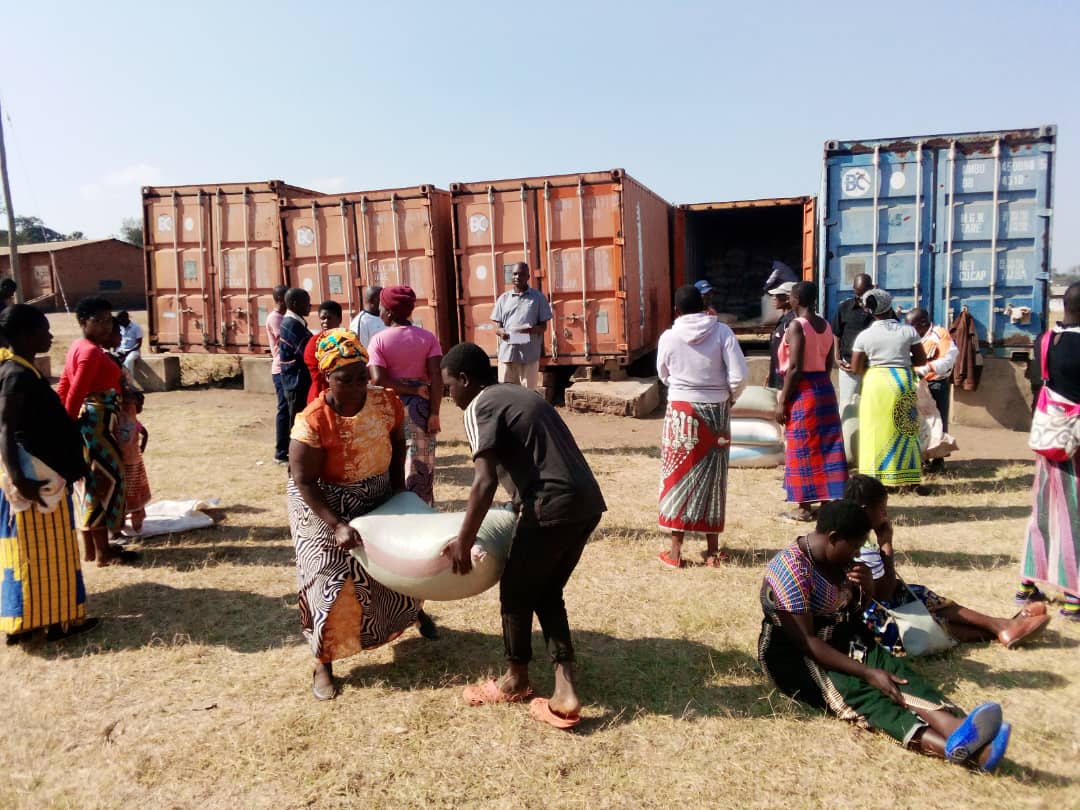
MALAWI: Salesian Missions donors provide funding for maize for 382 families through St. Don Bosco Parish in Lilongwe
Salesian missionaries have been able to help families address nutritional shortfalls, especially important now as they face the global pandemic.
NEW ROCHELLE, NY (July 22, 2020) St. Don Bosco Parish in Lilongwe, Malawi, received funding from Salesian Missions donors to buy maize to help families in the out-stations of the parish. In total, 382 families received the maize. At the Don Bosco Church, 280 families from 28 small Christian communities benefited along with families connected to Salesian centers in Mbunu, Kundi, Kangonoma, Chipeni and more.
“We appreciate the support of our donors who were able to provide the funding to help poor families in Malawi,” said Father Gus Baek, director of Salesian Missions, the U.S. development arm of the Salesians of Don Bosco. “Providing maize helps families have the nutritional support they need, especially during a time of great difficulty during the pandemic. Many families have seen a loss of income and have been pushed further into poverty.”
Father Mulenga Oswald, St. Don Bosco Parish priest, said, “We sincerely thank Salesian Missions donors for their support, which enabled us to reach out to needy families of our parish. Salesian Missions prompt response helped us to mobilize and assist the people that needed help most.”
In Lilongwe, Salesian missionaries provide many programs to help support poor youth and their families. The Don Bosco Youth Center offers counseling workshops, seminars and educational literature that addresses the multitude of challenges faced by youth in the region. The program focuses on life skills training and the avoidance of high-risk behavior such as substance abuse and gang participation.
During normal operations, The Don Bosco Youth Center hosts more than 600 youth each day from the surrounding townships of Areas 23, 24, 44, Kawale and Chilinde, among others. It has become a symbol of youth empowerment through sporting activities as well as vocational and technical education. The center conducts motivational evening talks for spiritual and moral growth and also provides leadership training for youth with the aim of equipping them with skills in leading other youth toward positive behavior and social change in their respective communities.
The Don Bosco Youth Center campus includes facilities for youth development in sporting disciplines and features a soccer pitch and courts for basketball, netball and volleyball. The campus includes the Don Bosco Youth Technical Institute which offers commercial and technical courses in fashion arts and beauty, accounting, bricklaying, motor vehicle mechanics, hospitality, and information and communications technology.
In Malawi, more than 50 percent of the population lives in poverty and the majority of households have women as the head of the household, according to the World Bank.
Agriculture is a central part of Malawi’s economy but land distribution is unequal and crops are highly vulnerable to the region’s frequent droughts. Few houses have piped water and less than one in 10 Malawians has access to electricity. Water is collected from wells or streams, and most people cook over an open fire. Malawians deal with hunger and malnutrition on a daily basis. According to the U.S. Agency for International Development, 45 percent of the country’s children under age 5 are stunted due to a lack of adequate nutrition. Many children also lack educational opportunities and have few options for improving their circumstances.
###
Contact: [email protected]
